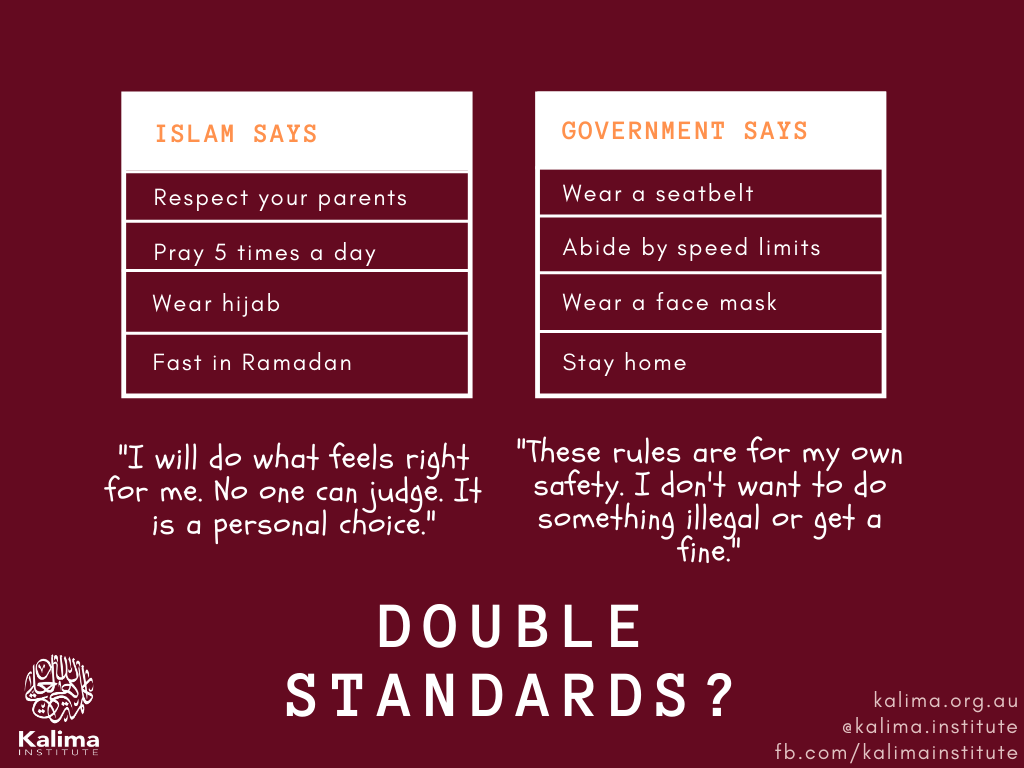When we follow a rule or a law, we do so because we trust those who made the rule and fear punishment or desire reward. That is why when the government, for example, command us to stay at home or we’ll be penalised, we firmly abide by it without question. We may not be convinced, and it involves a sacrifice of personal comfort. Regardless, we follow it believing we are doing it for the safety of others and because we do not want to pay a hefty fine. However, when Allah (swt) out of His love and mercy tells us to pray five times every day for example, we take it lightly and unashamedly disobey His commands under the guise of “choice”. This applies to everything we are obliged to do in Islam that we do not take seriously.

There are a few problems here:
1) We do not trust Allah (swt) enough. When you trust Him, you will follow everything He tells you to do without hesitation. What Allah (swt) decrees for us is always for our own good, unlike laws determined by fallible human beings which may be flawed. Allah (swt) gains nothing from our worship and loses nothing if we do not worship Him:
يَا أَيُّهَا النَّاسُ أَنتُمُ الْفُقَرَاءُ إِلَى اللَّهِ ۖ وَاللَّهُ هُوَ الْغَنِيُّ الْحَمِيدُ
O mankind, you are those in need of Allah, while Allah is the Free of need, the Praiseworthy.
-Qur’an 35:15
Therefore, what He tells us to do is purely for our own good and for the benefit of humanity – if we believed this wholeheartedly we would not hesitate to follow Allah’s laws even for a single moment.
2) We are in denial of the Day of Judgement. We follow the laws imposed on us by the government whether we agree with them or not, because we believe in the inevitable punishment we could face if we violate the law. When it comes to the laws that Allah (swt) has ordered us to abide by, many will disobey Him without even giving a second thought, or feeling any sense of shame. Doing this implies that we do not truly comprehend that we will be held accountable for our actions. Yes, Allah (swt) is All-Merciful. But His justice is part of this mercy, and that means He will reward those who do the right thing and punish those who do not, after describing to us clearly in the Qur’an what is right and what is wrong.
The solution to this is simply to read more Qur’an, which encloses endless reminders of the inevitable occurrence of the Day of Judgement:
وَقَالَ الَّذِينَ كَفَرُوا لَا تَأْتِينَا السَّاعَةُ ۖ قُلْ بَلَىٰ وَرَبِّي لَتَأْتِيَنَّكُمْ
Those who disbelieve say: “The Hour will not come to us.” Say: “Yes, by my Lord, it will come to you.”
-Qur’an 34:3اللَّهُ لَا إِلَٰهَ إِلَّا هُوَ ۚ لَيَجْمَعَنَّكُمْ إِلَىٰ يَوْمِ الْقِيَامَةِ لَا رَيْبَ فِيهِ ۗ وَمَنْ أَصْدَقُ مِنَ اللَّهِ حَدِيثًا
Allah, there is no god [worthy of worship] except Him. He will certainly gather [all of] you together on the Day of Judgment—about which there is no doubt. And whose word is more truthful than Allah’s?
-Qur’an 4:87وَكَانُوا يَقُولُونَ أَئِذَا مِتْنَا وَكُنَّا تُرَاباً وَعِظَاماً أَإِنَّا لَمَبْعُوثُونَ•أَوَآبَاؤنَ
ا الْأَوَّلُونَ•قُلْ إِنَّ الْأَوَّلينَ وَالْآخِرِينَ•لَمَجْمُوعُو نَ إِلَىٰ مِيقَاتِ يَوْمٍ مَّعْلُومٍ
And they used to say, “When we die and become dust and bones, are we indeed to be resurrected?
And our forefathers [as well]?”
Say, [O Muhammad], “Indeed, the former and the later peoples are to be gathered together for the appointment of a known Day.”
– Qur’an 56:47-50
3) We are not making the right choices. Everything is a choice, but that doesn’t mean that all choices are good. Allah (swt) says:
فَمَن يَعْمَلْ مِثْقَالَ ذَرَّةٍ خَيْرًا يَرَهُ
وَمَن يَعْمَلْ مِثْقَالَ ذَرَّةٍ شَرًّا يَرَهُ
So whoever does an atom’s weight of good will see it,
And whoever does an atom’s weight of evil will see it.
– Qur’an 99:7-8
These ayahs confirm our freedom to choose what actions we take – but also that there are consequences to these actions.
We have the choice to wear a seatbelt, but if we choose not to we are doing the wrong thing. We have a choice to wear a face mask, but if we don’t do that we will recieve a fine. Similarly, if we choose not to wear the hijab for example, we are doing the wrong thing although it remains a choice, and for that there are consequences.
Let’s rethink our priorities and truly assess ourselves: do we take state law more seriously than Islamic law? If so – although following state law is also important – we must change our priorities so that we can receive His ultimate pleasure inshaAllah, and be of the successful ones in this world and the next.





